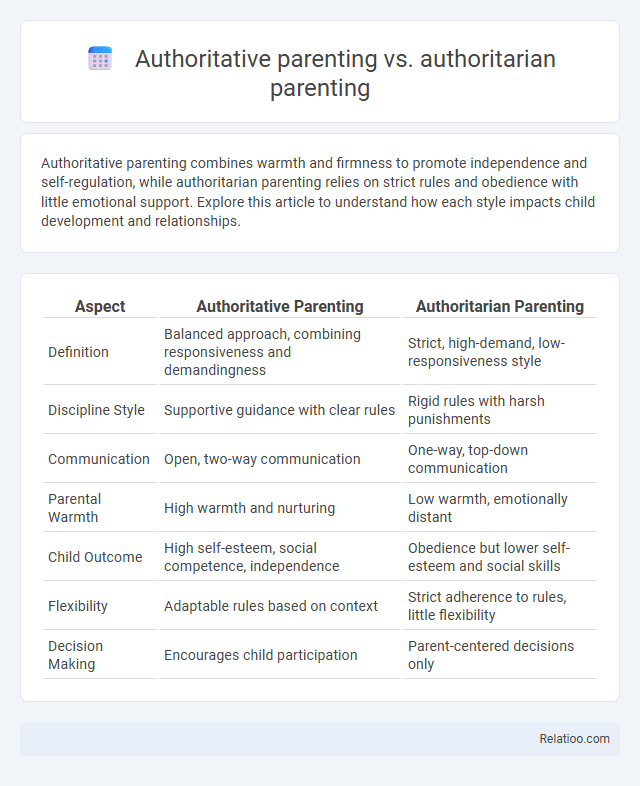Authoritative parenting combines warmth and firmness to promote independence and self-regulation, while authoritarian parenting relies on strict rules and obedience with little emotional support. Explore this article to understand how each style impacts child development and relationships.
Table of Comparison
| Aspect | Authoritative Parenting | Authoritarian Parenting |
|---|---|---|
| Definition | Balanced approach, combining responsiveness and demandingness | Strict, high-demand, low-responsiveness style |
| Discipline Style | Supportive guidance with clear rules | Rigid rules with harsh punishments |
| Communication | Open, two-way communication | One-way, top-down communication |
| Parental Warmth | High warmth and nurturing | Low warmth, emotionally distant |
| Child Outcome | High self-esteem, social competence, independence | Obedience but lower self-esteem and social skills |
| Flexibility | Adaptable rules based on context | Strict adherence to rules, little flexibility |
| Decision Making | Encourages child participation | Parent-centered decisions only |
Understanding Parenting Styles: Authoritative vs Authoritarian
Authoritative parenting combines high responsiveness with clear boundaries, fostering independence and social competence in children. In contrast, authoritarian parenting emphasizes strict rules and obedience, often leading to lower self-esteem and social skills. Understanding your parental authority style helps create a balanced approach that promotes healthy development and respect.
Core Characteristics of Authoritative Parenting
Authoritative parenting is characterized by high responsiveness and high demands, where parents set clear rules while also being nurturing and supportive, fostering open communication and independence. Unlike authoritarian parenting, which emphasizes strict discipline and obedience with low warmth, authoritative parents balance structure with emotional responsiveness, promoting self-regulation and social competence in children. Parental authority in authoritative parenting derives from mutual respect and reasoned guidance, contrasting with authoritarian methods based on control and punishment.
Key Traits of Authoritarian Parenting
Authoritarian parenting is characterized by strict rules, high demands, and little warmth or feedback, emphasizing obedience and discipline over open communication. Unlike authoritative parenting, which balances firmness with responsiveness and support, authoritarian parents expect unquestioned compliance from their children. Your approach to parental authority influences children's social development, with authoritarian parenting often linked to lower self-esteem and social skills.
Comparing Communication Approaches
Authoritative parenting fosters open, two-way communication, encouraging children to express their thoughts while parents maintain clear expectations. Authoritarian parenting relies on one-way communication, emphasizing obedience and strict rules with little room for dialogue or emotional exchange. Your understanding of parental authority shifts as you recognize that effective communication in authoritative styles supports autonomy, whereas authoritarian methods enforce control without nurturing understanding.
Impact on Child Development and Behavior
Authoritative parenting promotes child development by balancing warmth and discipline, fostering independence, social competence, and emotional regulation. In contrast, authoritarian parenting, characterized by strict rules and high demands with low responsiveness, often leads to lower self-esteem, increased anxiety, and poorer social skills in children. Parental authority varies in effectiveness based on the style employed, with authoritative approaches consistently linked to positive behavioral outcomes and authoritarian methods associated with more behavioral problems and reduced emotional well-being.
Emotional Outcomes for Children
Authoritative parenting, characterized by warmth and clear boundaries, promotes positive emotional outcomes such as higher self-esteem and better emotional regulation in children. Authoritarian parenting, defined by strict rules and low responsiveness, often leads to increased anxiety, lower self-worth, and difficulties in emotional expression. Parental authority that balances firmness with empathy supports healthy emotional development, reducing the risk of behavioral problems and fostering resilience.
Discipline Techniques: What Sets Them Apart
Authoritative parenting employs balanced discipline techniques, combining clear rules with warmth and open communication, fostering self-regulation and mutual respect. Authoritarian parenting relies on strict, high-demand rules enforced through punishment, emphasizing obedience without explaining reasons behind the discipline. Understanding these differences helps you tailor your parental authority approach to promote effective discipline and healthy child development.
Academic Performance and Social Skills
Authoritative parenting, characterized by high responsiveness and reasonable demands, significantly enhances academic performance and social skills by fostering self-discipline and open communication. Authoritarian parenting, marked by strict rules and low warmth, often results in lower academic motivation and poorer social integration due to increased anxiety and reduced self-confidence. Parental authority that balances guidance with emotional support promotes optimal cognitive and social development, creating a positive environment for academic success and interpersonal growth.
Long-term Effects Into Adulthood
Authoritative parenting, characterized by warmth and clear boundaries, fosters higher self-esteem, better social skills, and emotional regulation into adulthood. Authoritarian parenting, marked by strict rules and less responsiveness, often leads to lower self-confidence, increased anxiety, and difficulties in independent decision-making in later life. Understanding the nuances of parental authority helps you recognize that a balanced approach promotes healthier long-term outcomes in your child's adult development.
Choosing the Best Approach for Your Family
Authoritative parenting combines warmth and structure, promoting open communication and fostering independence while maintaining clear boundaries, which leads to positive child development outcomes. Authoritarian parenting relies on strict rules and high expectations with little emotional warmth, often resulting in obedience but potentially hindering self-esteem and social skills. Balancing parental authority with responsiveness and guidance helps families choose the best approach by adapting strategies that meet their child's unique needs and personality.

Infographic: Authoritative parenting vs Authoritarian parenting
 relatioo.com
relatioo.com